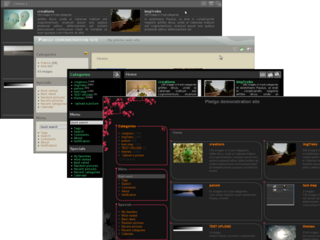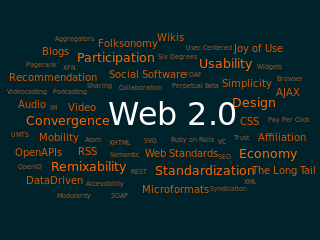
Adobe Photoshop is a raster graphics editor developed and published by Adobe Inc. for macOS and Windows. It was originally created in 1988 by Thomas and John Knoll. Since then, it has become the de facto industry standard in raster graphics editing, to the point that it has also become a generic trademark leading to its use as a verb such as "to photoshop an image", "photoshopping", and "photoshop contest", although Adobe discourages such use. Photoshop can edit and compose raster images in multiple layers and supports masks, alpha compositing, and several color models including RGB, CMYK, CIELAB, spot color, and duotone. Photoshop uses its own PSD and PSB file formats to support these features. In addition to raster graphics, Photoshop has limited abilities to edit or render text, vector graphics, 3D graphics, and video. Its feature set can be expanded by Photoshop plug-ins, programs developed and distributed independently of Photoshop that can run inside it and offer new or enhanced features.

Wiki software is a collaborative software that runs a wiki, which allows users to create and collaboratively edit "pages" or entries via a web browser. A wiki system is usually a web application that runs on one or more web servers. The content, including all current and previous revisions, is usually stored in either a file system or a database. Wikis are a type of web content management system, and the most commonly supported off-the-shelf software that web hosting facilities offer. There are currently dozens of actively maintained wiki engines, in a variety of programming languages, including both open source and proprietary applications. These vary widely in their platform support, in their support for natural language characters and conventions, and in their assumptions about technical versus social control of editing.

Moodle is a free and open-source learning management system (LMS) written in PHP and distributed under the GNU General Public License. Developed on pedagogical principles, Moodle is used for blended learning, distance education, flipped classroom and other e-learning projects in schools, universities, workplaces and other sectors.

WordPress (WordPress.org) is a free and open-source content management system (CMS) based on PHP & MySQL. Features include a plugin architecture and a template system. It is most associated with blogging but supports other types of web content including more traditional mailing lists and forums, media galleries, and online stores. Used by more than 60 million websites, including 30.6% of the top 10 million websites as of April 2018, WordPress is the most popular website management system in use. WordPress has also been used for other application domains such as pervasive display systems (PDS).

b2evolution is a content and community management system written in PHP and backed by a MySQL database. It is distributed as free software under the GNU General Public License.
Image sharing, or photo sharing, is the publishing or transfer of a user's digital photos online. Image sharing websites offer services such as uploading, hosting, managing and sharing of photos. This function is provided through both websites and applications that facilitate the upload and display of images. The term can also be loosely applied to the use of online photo galleries that are set up and managed by individual users, including photoblogs. Sharing means that other users can view but not necessarily download images, and users can select different copyright options for their images.
A web content management system is a software content management system (CMS) specifically for web content. It provides website authoring, collaboration, and administration tools that help users with little knowledge of web programming languages or markup languages create and manage website content. A WCMS provides the foundation for collaboration, providing users the ability to manage documents and output for multiple author editing and participation. Most systems use a content repository or a database to store page content, metadata, and other information assets the system needs.

Joomla! is a free and open-source content management system (CMS) for publishing web content, developed by Open Source Matters, Inc. It is built on a model–view–controller web application framework that can be used independently of the CMS.

Aptana, Inc. is a company that makes web application development tools for Web 2.0 and Ajax for use with a variety of programming languages. Aptana's main products include Aptana Studio, Aptana Cloud and Aptana Jaxer.

Zoho is a web-based online office suite containing word processing, spreadsheets, presentations, databases, note-taking, wikis, web conferencing, customer relationship management (CRM), project management, invoicing, and other applications developed by ZOHO Corporation, a California-based company. It was launched in 2005 with a web-based word processor. Additional products such as spreadsheets and presentations, were incorporated later into Zoho. Zoho applications are distributed as software as a service (SaaS).
Qcodo is an open-source PHP web application framework which builds an object-relational model (ORM), CRUD UI pages, and AJAX hooks from an existing data model. It additionally includes a tightly-integrated HTML and JavaScript form toolkit which interfaces directly with the generated entities. It is a robust, comprehensive framework which can be utilized by small and large Web applications alike.

Serendipity is a blog and web-based content management system written in PHP and available under a BSD license. It supports PostgreSQL, MySQL, SQLite database backends, the Smarty template engine, and a plugin architecture for user contributed modifications.

Piwigo is photo gallery software for the web, built by an active community of users and developers. Freely available extensions make Piwigo easily customizable. It is notable as a system with many features.

OnlyOffice, stylized as ONLYOFFICE, is an office suite developed by Ascensio System SIA, a company with headquarters in Riga, Latvia. Solution features online document editors, platform for document management, corporate communication, mail and project management tools.

Vanilla is a Canadian software company founded in 2009 in Montreal, Quebec, Canada. It is both a cloud-based (SaaS) community forum software and an open source community supported software. The company’s main product is Vanilla Cloud.

Oxwall is forum software distributed under the Common Public Attribution License. It is used as a platform for social networking and community sites. The default Oxwall software core contains basic community features that include uploading/sharing content, friends networking, profile and page layout customization, user and content management, built-in SEO. Oxwall comes with several default themes that are customizable with admin dashboard tools. The Oxwall core is extensible by plugins. The plugins are available at the Oxwall Store, and are provided both by native and third-party developers. Plugin installation is performed via the admin dashboard.
openQRM is a free and open-source cloud computing management platform for managing heterogeneous data center infrastructures.

pH7CMS is an open source Social Dating software that allows creation of online communities and social dating services.














